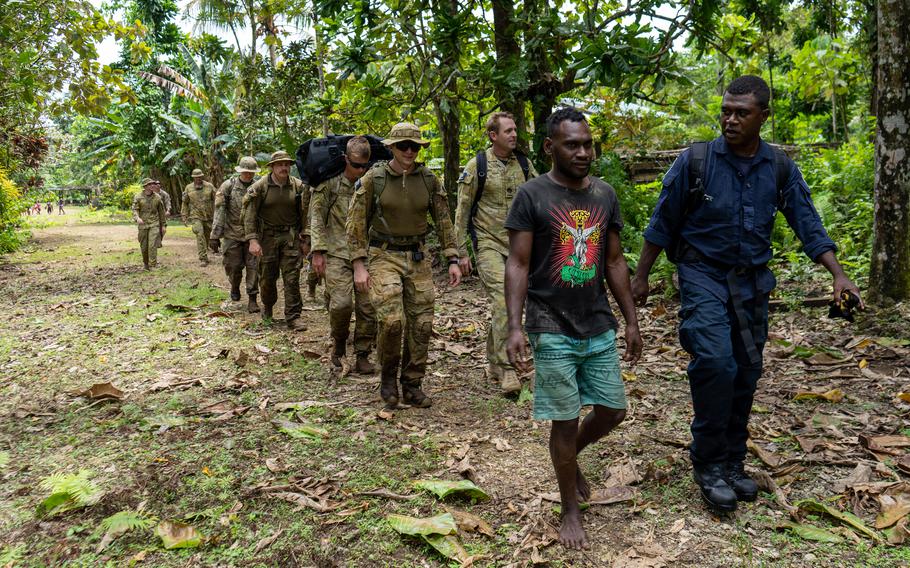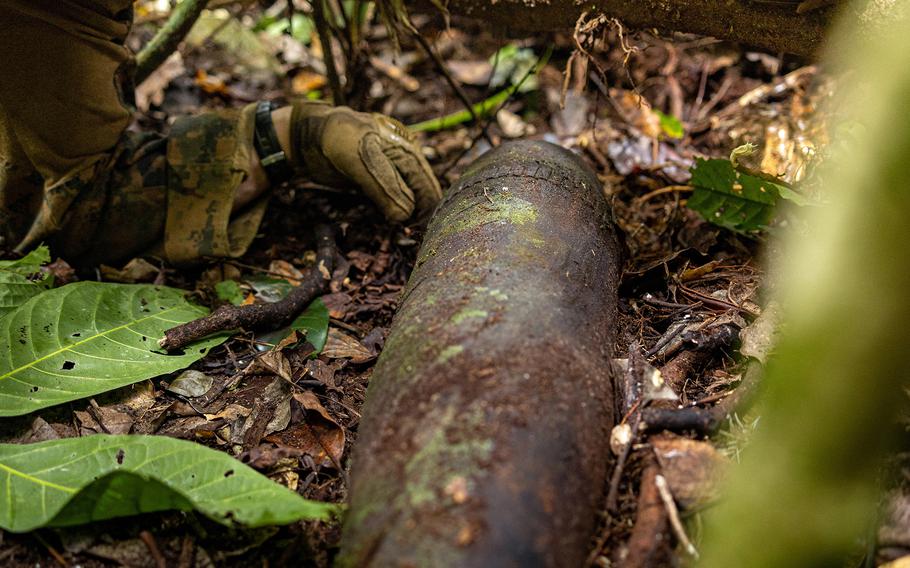
Locals lead a multinational force of service members to unexploded ordnance in Ringgi Cove, Kolombangara, Solomon Islands, Sept. 9, 2024. (Kassie McDole/U.S. Marine Corps)
Explosive ordnance technicians from six countries helped remove more than 3,200 World War II-era bombs, shells and bullets from the Solomon Islands this month.
Sixty-five U.S. soldiers and Marines supported the largest iteration of Operation Render Safe in the islands, Army 1st Lt. Joe Gardner, who led American troops during the mission, said by phone Friday.
The operation, in its 20th year, is an annual Australian-led mission to clear World War II ordnance from the Pacific, according to the Australian Defence Force website.
Troops from Australia, Canada, New Zealand, Japan and South Korea also took part in the mission.
The Allies liberated the Solomons from the Japanese during the war. More than 7,000 Marines died during the seven-month Battle of Guadalcanal.
However, U.S. and Australian officials were stunned when Solomon Islands announced in early 2022 that it was entering into a security agreement with China, opening the possibility that Beijing could use the nation to bolster its military presence in the region.

Marine Corps Sgt. William Barker, an explosive ordnance disposal technician with Marine Rotational Force – Darwin, uncovers a World War II-era shell in Munda, New Georgia, Solomon Islands, Sept. 9, 2024. (Juan Torres/U.S. Marine Corps)
China has no such long-serving commitment as Render Safe in the region nor do Chinese troops have the experience that previous bomb disposal projects have brought to American, Australiana and New Zealand teams, New Zealand-based security expert Paul Buchanan said by email Friday.
“This and previous exercises of the kind simply reaffirm the WW2 allies’ commitment to the people of the Solomons and elsewhere in Melanesia that they will continue to do their part in making regional landscapes safe again,” he said. “If that helps off-set or balance PRC [People’s Republic of China’s] diplomatic efforts in the region, then as far as the WW2 allies are concerned, that is an added bonus.”
U.S. personnel involved in Render Safe included bomb technicians from U.S. Army Pacific and Marine Rotational Force – Darwin, which will soon wrap a six-month mission in Australia, said Gardner, an explosive ordnance disposal officer with 303rd EOD Battalion, 8th Military Police Brigade, 8th Theater Sustainment Command.
Explosive ordnance disposal teams worked on three small islands in the Solomons with an aviation component based in the capital, Honiara, 217 miles to the east, the Australian Defence Force said in a Sept. 19 statement.
Soldiers and Marines encountered numerous battle remnants, from rusting helmets to downed aircraft, in the jungle and underwater during the mission, Gardner said.
“With the vegetation, a lot of stuff is relatively untouched,” he said. “Divers saw a bomber with its wings attached underwater.”
Disposing of conventional munitions is the core mission of explosive ordnance troops, Gardner said.
In recent years, the technicians have been focused on that mission after years of dealing with improvised explosive devices in Iraq and Afghanistan, he said.
“This (work in the Solomons) is the same job we would be doing downrange,” he said.